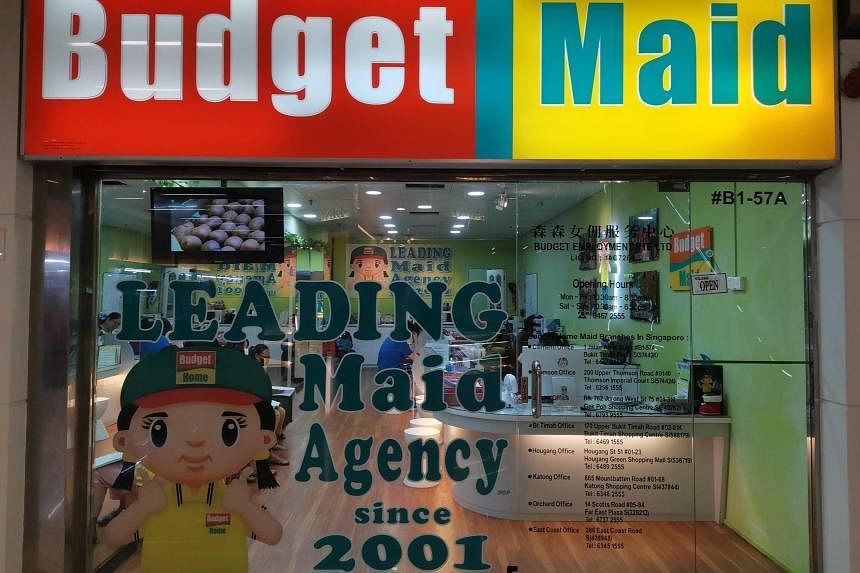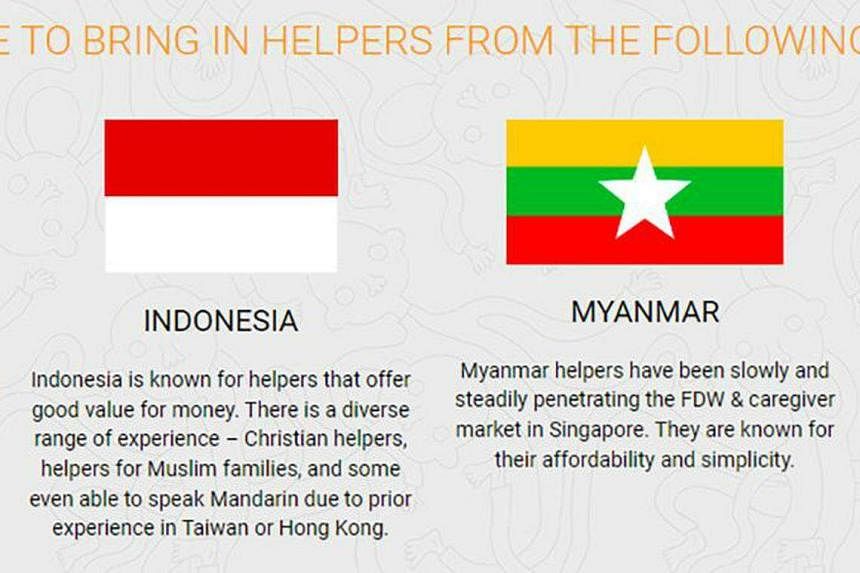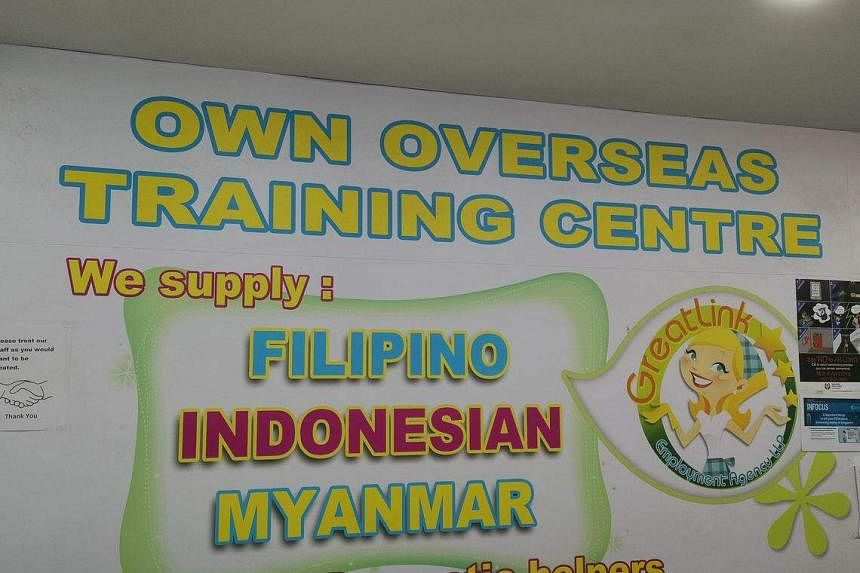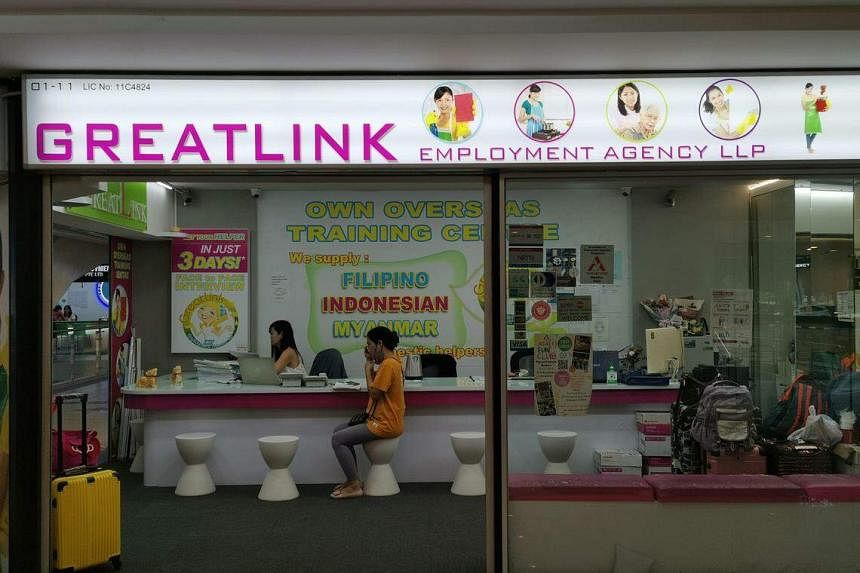
Current MOM guidelines require that ads do not mention fees or liken maids to merchandise that can be bought and replaced when found unsatisfactory.
ST PHOTO: CHRISTINE SIOW
Christine Siow
SINGAPORE – They jostle for customers with promises of “good value for money” and “affordable” in notices they place on their shop windows, but the items on sale are not goods.
Instead, three dozen or so maid agencies at Bukit Timah Shopping Centre are peddling migrant workers.
At the adjacent Beauty World Plaza, Hope Recruitment has domestic workers from Myanmar who “are known for their affordability and simplicity”. Those from north-east India are “affordable”.
When contacted later by The Straits Times, the maid agency’s key appointment holder, who wished to be known only as Mr Tan, acknowledged that the statements were disrespectful.
“We recently took ownership of Hope Recruitment in January and were not aware about the marketing information put out by the previous owner. These statements have since been removed,” he added.

Hope Recruitment’s website indicated that helpers from certain countries are “value for money”, “affordable”, or known for their “simplicity”.
PHOTO: HOPERECRUITMENT.COM.SG
Ms Mechelle Bonagua, a sales executive at Joy Employment Services, which is in Bukit Timah Shopping Centre, said that ads put up by other agencies were worse in the past.
“I’ve worked in this field for 15 years, and back then, maids were really treated like goods. Posters would say maids can be delivered, and their biodata would be put out there for everyone (to) see,” added the 40-year-old Filipina.
There were no advertisements at her agency.
In 2014, the Ministry of Manpower (MOM) issued an advisory after several maid agencies put up insensitive ads which likened domestic workers to goods.
Among other things, the agencies at Katong Shopping Centre and Bukit Timah Shopping Centre had advertised the domestic workers as “$1 maids” with promises of “fast delivery”.
Shortly after, the agencies removed the ads.
Current MOM guidelines require that ads do not mention fees or liken maids to merchandise that can be bought and replaced when found unsatisfactory.
MOM said agencies should also not advertise maids’ subjective qualities, like obedience and intelligence.
Ms Mechelle Bonagua, a sales executive at Joy Employment Services, which is in Bukit Timah Shopping Centre, said that ads put up by other agencies were worse in the past.
“I’ve worked in this field for 15 years, and back then, maids were really treated like goods. Posters would say maids can be delivered, and their biodata would be put out there for everyone (to) see,” added the 40-year-old Filipina.
There were no advertisements at her agency.
In 2014, the Ministry of Manpower (MOM) issued an advisory after several maid agencies put up insensitive ads which likened domestic workers to goods.
Among other things, the agencies at Katong Shopping Centre and Bukit Timah Shopping Centre had advertised the domestic workers as “$1 maids” with promises of “fast delivery”.
Shortly after, the agencies removed the ads.
Current MOM guidelines require that ads do not mention fees or liken maids to merchandise that can be bought and replaced when found unsatisfactory.
MOM said agencies should also not advertise maids’ subjective qualities, like obedience and intelligence.
Employment agencies to conduct checks on welfare of new maids from Dec
Threatening, controlling behaviour towards maids among main types of emotional abuse: Home report
Some advocates are concerned that marketing material has remained demeaning. They say this could affect how employers treat maids.
A spokesman for the Humanitarian Organisation for Migration Economics (Home) said: “Employers often look to agents to guide them in recruiting domestic helpers, so agents’ attitude towards helpers may inform how employers treat them too.”
She added: “Agents’ behaviour may not be the single determining factor for how employers treat their helpers, but (they) may entrench employers’ beliefs that helpers are not deserving of respect.”
Mr Alvin Puan, 35, co-owner of Iron Maid Employment Agency, said the ads are just a marketing tactic.
“Some people might be offended about words like ‘supply’, but the majority of employers don’t care. These ads are meant to be eye-catching and attractive to employers.”
Ms Mei Tan, the manager of GreatLink Employment Agency, said it will be changing its ad, which says it supplies maids from the Philippines, Indonesia and Myanmar.
She said: “It is not our intention to dehumanise or portray our helpers as objects. We will be changing our marketing material’s choice of words as we do not wish to be misunderstood by the public.”
Another common term used in ads is “budget maid”.

GreatLink Employment Agency’s branch at Bukit Timah Shopping Centre displays a large poster indicating that they “supply” domestic helpers.
ST PHOTO: CHRISTINE SIOW
The manager of a maid agency at Bukit Timah Shopping Centre said the words used in ads could lead to some misunderstanding.
The 59-year-old, who wanted to be known as Madam Tan and has 15 years of experience in the business, said: “Those phrases (like budget) refer to agencies’ placement fees being low, not maids being budget goods. The public might see the ads and think that maids are cheap, but that’s not what agencies mean.”
Assistant Professor Luke Lu, who teaches linguistics and multilingual studies at Nanyang Technological University (NTU), said when people absorb information, they are not just taking in the dictionary meaning.
“We’re also bringing in our social framing based on our experiences,” he added.
“So if you were brought up with the idea that helpers are cheap, and they ought to be treated in a subhuman way, you might interpret these advertisements in a harmful and discriminatory way.”
Associate Professor Laavanya Kathiravelu of NTU’s School of Social Sciences stressed the damaging societal impact that such marketing material has.
“(Maid) agencies often generate harmful stereotypes to advertise, for example, that maids from Myanmar are more docile and less demanding of rights like days off and privacy,” she said, adding that as a result, maids are dehumanised.
Prof Lu said the ads constrain the way people think about maids.
“Instead of thinking of them as human, we think of them as commodities to be traded. Even though advertisements’ choice of words don’t fully determine our attitudes, it’s a good indicator of how people actually view and treat helpers.
“While agencies can say that they are just catering to what their customers want, they are in a position to change perceptions,” he added.

The manager of a maid agency at Bukit Timah Shopping Centre said the words used in ads could lead to some misunderstanding.
The 59-year-old, who wanted to be known as Madam Tan and has 15 years of experience in the business, said: “Those phrases (like budget) refer to agencies’ placement fees being low, not maids being budget goods. The public might see the ads and think that maids are cheap, but that’s not what agencies mean.”
Assistant Professor Luke Lu, who teaches linguistics and multilingual studies at Nanyang Technological University (NTU), said when people absorb information, they are not just taking in the dictionary meaning.
“We’re also bringing in our social framing based on our experiences,” he added.
“So if you were brought up with the idea that helpers are cheap, and they ought to be treated in a subhuman way, you might interpret these advertisements in a harmful and discriminatory way.”
Associate Professor Laavanya Kathiravelu of NTU’s School of Social Sciences stressed the damaging societal impact that such marketing material has.
“(Maid) agencies often generate harmful stereotypes to advertise, for example, that maids from Myanmar are more docile and less demanding of rights like days off and privacy,” she said, adding that as a result, maids are dehumanised.
Prof Lu said the ads constrain the way people think about maids.
“Instead of thinking of them as human, we think of them as commodities to be traded. Even though advertisements’ choice of words don’t fully determine our attitudes, it’s a good indicator of how people actually view and treat helpers.
“While agencies can say that they are just catering to what their customers want, they are in a position to change perceptions,” he added.

Ms Mei Tan, the manager of GreatLink Employment Agency, said it will be changing its ad, which says it supplies maids from the Philippines, Indonesia and Myanmar.
ST PHOTO: CHRISTINE SIOW
Several maid agencies ST approached said MOM ought to take the lead in setting guidelines.
Said Madam Tan: “(The) MOM controls what we put in our ads. For example, we cannot use “fresh maid” any more.
“I don’t know if the current regulations should be changed. It’s up to them.”
An MOM spokesman said enforcement action may be taken against maid agencies which put up insensitive ads.
He added that insensitive advertisements which cast maids in an undignified, offensive light are unacceptable.
The Home spokesman said that while tighter regulations may deter agencies from advertising maids in an undignified way, it is important to educate them to view domestic workers as equals to their employers.
Still, Prof Lu said increasing regulations may not solve the root issue.
“Top-down regulations on language use may not translate to a change in our attitudes. We should instead have societal conversations about how we treat helpers, and where our values lie.
“Our language use says a lot more about society than about employment agencies, domestic helpers, or employers. In a way, we’re all complicit,” he added.
Several maid agencies ST approached said MOM ought to take the lead in setting guidelines.
Said Madam Tan: “(The) MOM controls what we put in our ads. For example, we cannot use “fresh maid” any more.
“I don’t know if the current regulations should be changed. It’s up to them.”
An MOM spokesman said enforcement action may be taken against maid agencies which put up insensitive ads.
He added that insensitive advertisements which cast maids in an undignified, offensive light are unacceptable.
The Home spokesman said that while tighter regulations may deter agencies from advertising maids in an undignified way, it is important to educate them to view domestic workers as equals to their employers.
Still, Prof Lu said increasing regulations may not solve the root issue.
“Top-down regulations on language use may not translate to a change in our attitudes. We should instead have societal conversations about how we treat helpers, and where our values lie.
“Our language use says a lot more about society than about employment agencies, domestic helpers, or employers. In a way, we’re all complicit,” he added.

No comments:
Post a Comment